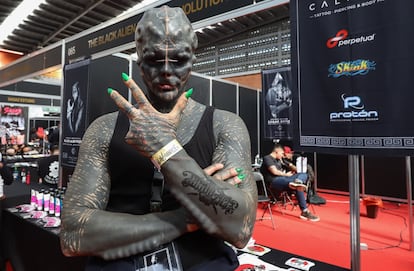After having some fingers and his ears removed, The Black Alien abandons his body modification project
Before the next step in his plan, which consisted in amputating a leg, Frenchman Anthony Loffredo decided to change course

Anthony Loffredo, also known as The Black Alien (35 years-old), announced last week his decision not to continue with his body transformation plan to look like a being from another planet. In an Instagram post, the Frenchman explained that the project had lost all meaning to him and that he was done altering his body. He plans to conclude his metamorphosis with a full cover-up, applying black ink to every inch of his skin. The body modifications he had done so far include finger amputation, the removal of ears and parts of the nose and lips, skull implants, the removal of parts of his dermis, the removal of his scalp and ink injections in the outer membrane of his eyeballs. Still, with all this, Loffredo considered his transformation to be at 65%.
These types of interventions are called extreme body modifications: voluntary, unconventional alterations with little social acceptance. They often require specialized surgical procedures and may be irreversible. What distinguishes them from other, less drastic modifications, such as common piercings or tattoos, is their radical nature: scarifications, subdermal implants, amputations or eye tattoos. The social perception of these practices varies considerably between cultures. With his 1.4 million followers, Loffredo established himself as one of the most recognized icons in the world of extreme body modification. He considers himself an artist, and his own body is the medium through which he expresses his art. He has described his body transformation project as a boundless artistic evolution in which he is both the creator and the work.
The story of The Black Alien has generated a social commotion due to both his appearance and his decision to stop the process before completing his metamorphosis. The multiple comments on social media — often callous — reflect this judgment, ignoring the fact that the next procedure that Loffredo had planned was the amputation of a leg in order to replace it with a biomechanical prosthesis. Youtuber Rene ZZ, who has more than 1.5 million subscribers on his channel, criticized Loffredo’s lack of consistency: “He abandons everything, to the point of also abandoning his only constant project — destroying his life to look like an alien.” In other, more positive comments, a key aspect has stood out: if Loffredo had prioritized transformation above all, there is no more significant change than changing one’s mind and moving towards new directions.
Before starting his project, Loffredo was a normal-looking young man that worked as a security guard at a nightclub. He began his transformation at 26 years old. In the interviews, he has never mentioned some epiphany or a specific event that prompted him to embark on this path that would have such profound consequences on his life. His first alteration was a forked tongue, similar to that of certain reptiles, such as snakes. For Loffredo, this act, followed by more drastic interventions such as the amputation of the nose, ears and fingers, does not constitute a mutilation, but “a personal evolution and an aesthetic improvement.” In a 2021 interview with the Spanish newspaper El Periódico, The Black Alien explained that these transformations actually made him feel better about himself and his body.
In 2012, the film American Mary portrayed the underground world of body modifications. These procedures are illegal in most countries; Loffredo used to travel the world looking for professionals who offered body modification services. Before announcing the end of his project, he had published a post requesting a new body modification specialist, as he had ceased his collaboration with Gatto Moreno, a Mexican modifier with whom he had been working until then. Meanwhile, Brendan “Dr Evil” McCarthy, from the UK, was found guilty of performing extreme body modifications without anesthesia, such as removing ears and a nipple and splitting tongues. After a two-year legal battle, the Court of Appeals ruled that his clients’ consent did not constitute a valid defense, resulting in a 40-month prison sentence. That was one of the first cases in the UK to directly address the legality of extreme body modifications outside of professional medical settings, and his sentence established an important legal precedent.

The documentary I Transformed Myself Into An Alien (2023, Arthur Bruel) examines the daily discrimination that Loffredo suffers as a consequence of his unique appearance. The young Frenchman describes the difficulties he encounters in everyday activities like having a beverage on a terrace or looking for a job. If he calls an Uber, the driver does not stop. He is not allowed in restaurants. He also had trouble verifying his identity to open an OnlyFans account, because the app was unable to recognize his face. “It’s an everyday struggle, because every day you find new people who don’t understand, who want to judge. That’s life; not everyone understands everything, just like I don’t understand many things about many people,” he said last year on the podcast Club 113.
The book Guinness World Records includes various feats of body modification from different cultures and origins. In the West, body modification symbolizes, on one hand, the integration into a subculture and, on the other, a separation that can lead to social exclusion. An emblematic case is that of Tom Leppard, also known as the Leopard Man, who died in 2016. Leppard devoted much of his life to transforming his appearance to resemble a leopard, tattooing about 90% of his body with spots. His commitment to this identity was such that he lived apart from civilization in a house that resembled a leopard’s den, which he built himself.
Many people with extreme body modifications have been seen by society — and themselves — as freaks that live off their grotesquely altered bodies, evoking the freak shows and circuses from the late 19th century. Eric Sprague, known as Lizard Man, defines himself as a “professional freak” and has participated in several minor movie roles. His fascination with lizards prompted him to invest time and money in his transformation, tattooing his body with scales, splitting his tongue and sharpening his upper teeth to resemble these creatures.
The Black Alien has mentioned on several occasions that his livelihood comes from working as a photography model, shooting videos and collaborating with different brands. His case is similar to that of Rick Genest, better known as Zombie Boy, who stood out for his extreme tattoos and his media presence. Diagnosed with a brain tumor at age 15, Genest experienced a radical change in his life that led him to explore tattoos and body modifications. Thanks to his unique appearance, he set two Guinness World Records and worked with notable figures such as Thierry Mugler, Jay-Z and Lady Gaga, including an appearance in the video for Born This Way. Genest, who died after falling from a window in 2018, at the age of 32, became a media figure, participating in films, advertisements and fashion shows, and leaving an indelible mark on popular culture.

At the moment of writing this article, The Black Alien’s Instagram account had not been available for a few days. This sudden absence, along with his recent announcement to end his transformation project, caused concern among his followers, who feared that Loffredo could be going through a difficult psychological time. However, rumors emerged suggesting a positive change in his life: the possibility that Loffredo was leaving his identity as The Black Alien behind due to the beginning of a romantic relationship. These rumors were confirmed last Tuesday by Loffredo himself when he shared a video on his YouTube channel: “I want to introduce you to my girlfriend, with whom I have started a new stage of my life.” This announcement marks the start of a happy chapter, and the end of an important process.
Sign up for our weekly newsletter to get more English-language news coverage from EL PAÍS USA Edition
Tu suscripción se está usando en otro dispositivo
¿Quieres añadir otro usuario a tu suscripción?
Si continúas leyendo en este dispositivo, no se podrá leer en el otro.
FlechaTu suscripción se está usando en otro dispositivo y solo puedes acceder a EL PAÍS desde un dispositivo a la vez.
Si quieres compartir tu cuenta, cambia tu suscripción a la modalidad Premium, así podrás añadir otro usuario. Cada uno accederá con su propia cuenta de email, lo que os permitirá personalizar vuestra experiencia en EL PAÍS.
¿Tienes una suscripción de empresa? Accede aquí para contratar más cuentas.
En el caso de no saber quién está usando tu cuenta, te recomendamos cambiar tu contraseña aquí.
Si decides continuar compartiendo tu cuenta, este mensaje se mostrará en tu dispositivo y en el de la otra persona que está usando tu cuenta de forma indefinida, afectando a tu experiencia de lectura. Puedes consultar aquí los términos y condiciones de la suscripción digital.









































